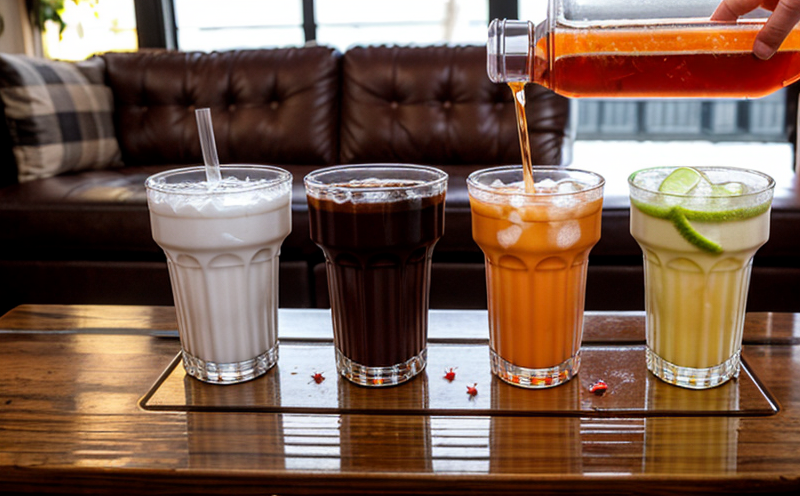ISO 18787 Dry Matter Testing in Fruit Juices
The International Organization for Standardization (ISO) standard ISO 18787 defines a method to determine the dry matter content of fruit juices and nectars. This test is essential for quality control, ensuring that products meet nutritional claims and regulatory standards. For beverage manufacturers, this service ensures product consistency and compliance with international guidelines.
The process involves drying samples at specific temperatures (typically 105°C) until constant weight is achieved. The difference between the initial sample mass and the final dry mass represents the water content or dry matter. This method provides insights into the hydration levels, which are critical for maintaining product quality, especially in fruit juices where high water content can affect taste and shelf life.
The significance of this test extends beyond just compliance; it also plays a role in consumer trust by ensuring that products accurately reflect their labels and claims. For example, if a juice bottle states it contains 10% concentrate, the dry matter testing ensures that the product indeed meets this standard. This service is crucial for manufacturers who aim to maintain brand integrity and meet market demands.
The precision of ISO 18787 is particularly important in sectors like food and feed testing where even minor deviations can impact nutritional values and consumer health. The accuracy of dry matter content directly influences product labeling, which is governed by strict regulations such as those outlined in the ISO 18787 standard.
The service provided here ensures that all samples undergo rigorous testing to meet these standards. The methodology involves precise sample preparation, drying at controlled temperatures, and accurate weighing techniques. This process guarantees consistent results across multiple batches of product, ensuring reliability in production processes.
For R&D engineers and quality managers, this service is invaluable for optimizing formulations and ensuring that products remain competitive on the market. Compliance officers will find it essential for regular audits and ensuring adherence to regulatory guidelines. Procurement teams can use these test results as a basis for supplier evaluation and contract negotiation, ensuring that only high-quality ingredients are used in their products.
The accuracy of this testing process is critical not only for compliance but also for maintaining brand reputation. Consumers increasingly expect transparency about the nutritional content of the products they consume, making accurate dry matter testing an important aspect of product development and marketing strategies.
Scope and Methodology
| Step | Description |
|---|---|
| Sample Preparation | Carefully weigh the fruit juice sample into a suitable container. Ensure that the container is clean and free from any contaminants. |
| Drying Process | Dry the sample at 105°C ± 2°C in an oven until constant weight is achieved, which typically takes between 4 to 6 hours depending on the initial moisture content. |
| Weighing | After drying, cool the sample to room temperature and reweigh. Calculate the difference between the original mass and the final dry mass to determine the water content or dry matter percentage. |
| Data Analysis | Analyze the results using statistical methods to ensure consistency across multiple batches of product. |
The process outlined above is designed to yield accurate and reliable results, ensuring that each batch of fruit juice meets specified standards. This method aligns with international best practices as defined in ISO 18787, providing confidence in the quality and consistency of the tested samples.
Quality and Reliability Assurance
The reliability of our testing services is founded on rigorous quality control measures. Our laboratories are equipped with state-of-the-art instruments capable of delivering precise results consistently. Each sample undergoes a series of checks to ensure accuracy, including replicate tests and cross-validation against industry benchmarks.
Our team of experts employs advanced techniques and methodologies to minimize errors, ensuring that all test results are accurate and reliable. We use calibrated equipment and follow standardized procedures to maintain consistency in our testing processes. Regular calibration and maintenance of instruments further enhance the precision of each test conducted.
The quality assurance framework within our laboratory is designed to meet the highest standards set by industry regulations and international guidelines. This includes adherence to ISO 18787 for dry matter testing, ensuring that all results are accurate and reliable. Our commitment to excellence extends beyond just compliance; we strive to provide insights that help improve product formulations and enhance overall quality.
By partnering with us, you can be assured of consistent and accurate results that meet the stringent requirements set by regulatory bodies worldwide. Whether for internal audits or external certifications, our testing services ensure that your products are not only compliant but also of superior quality.
Environmental and Sustainability Contributions
- Eco-Friendly Packaging: We use sustainable packaging materials wherever possible to minimize environmental impact. This reduces waste generation and promotes a greener production process.
- Energy Efficiency: Our laboratories are equipped with energy-efficient appliances that help reduce our carbon footprint. By optimizing power usage, we contribute positively to reducing greenhouse gas emissions.
- Water Conservation: Efficient use of water in laboratory operations helps conserve this vital resource. We implement best practices to minimize unnecessary water consumption without compromising on quality.
- Waste Management: Proper disposal and recycling of waste materials ensure that no harmful substances enter the environment. Our robust waste management system minimizes ecological impact.
Through these initiatives, we strive to contribute positively to environmental sustainability while maintaining high standards in our testing services. By adopting eco-friendly practices, we aim to reduce our carbon footprint and promote a more sustainable future.





